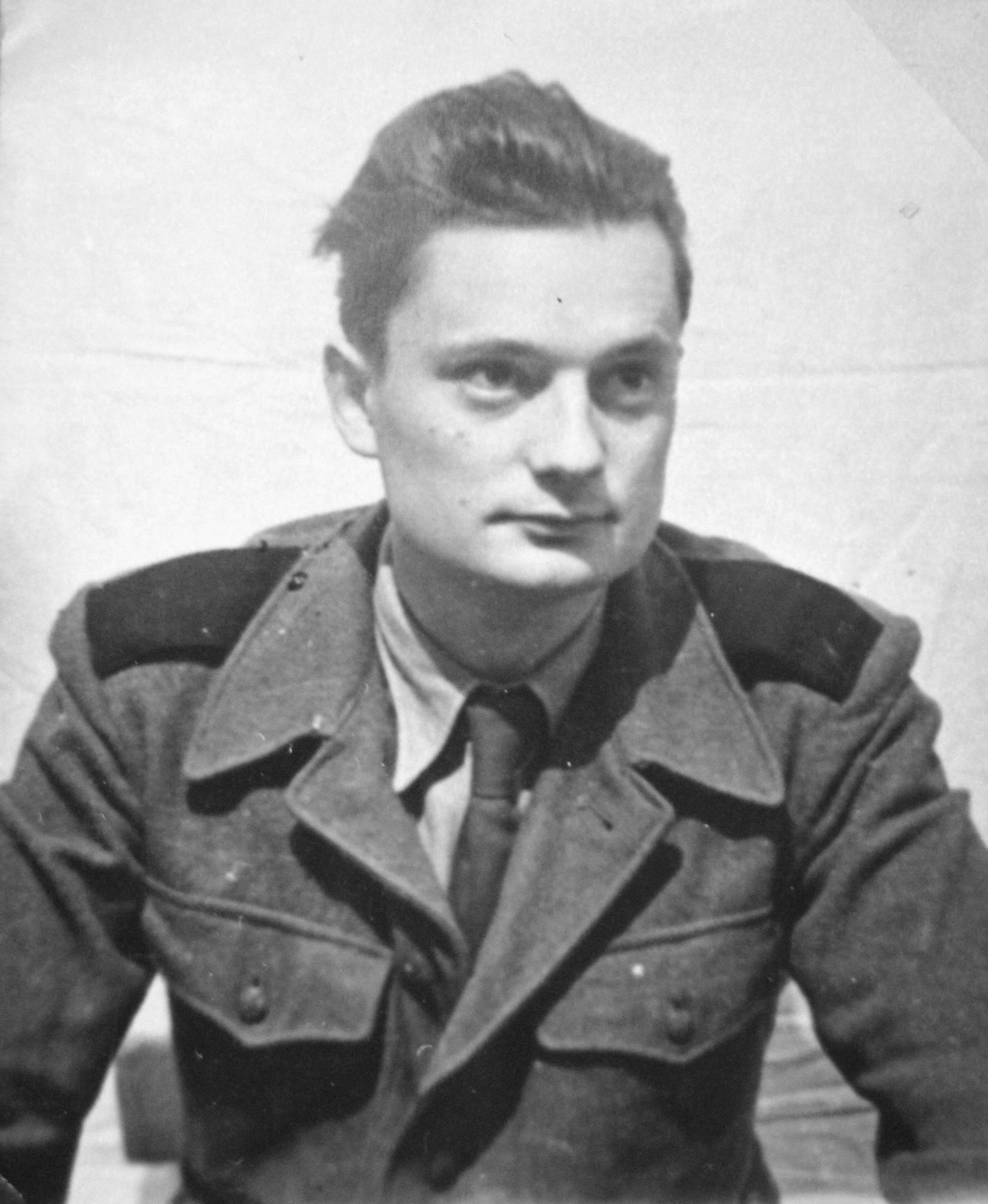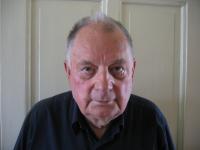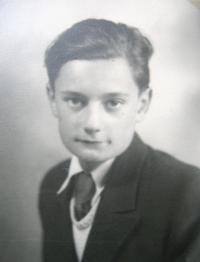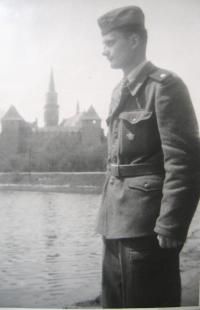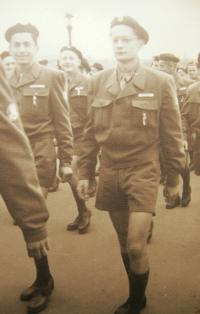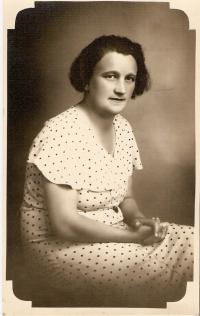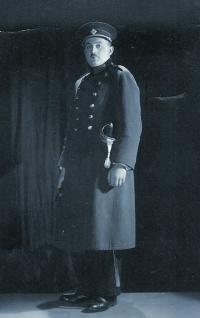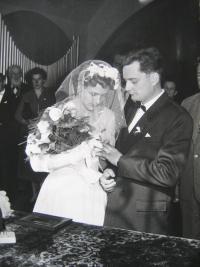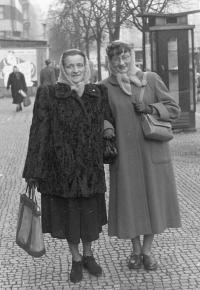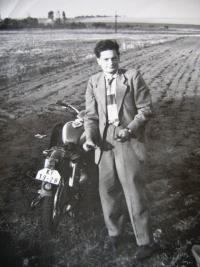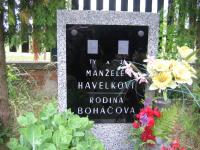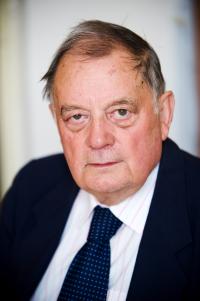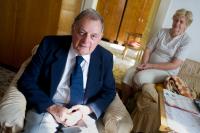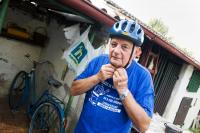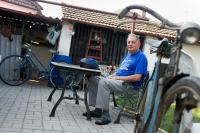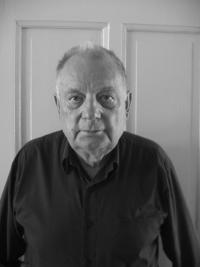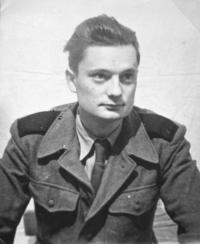I have never been happier in my whole life. I frequently find myself thinking about the innocent suffering of my father
Viktor Boháč was born in Prague on February 22nd, 1932. He comes from the famous Nymburk Family, Boháč. His grandfather was the mayor of Nymburk as a Czechoslovak National Socialist Party member. His father, Viktor, worked as a clerk for the Central Health Insurance Company and he was a famous National Socialist. His mother’s name was Božena, nee Bernatová. When Viktor Boháč was about three or four years old his family moved from Vinohrady to Lázně Velichovky. His father worked as a director there. During the German occupation of Czechoslovakia his father had some problems with the German occupation rules because he stood up for the Jewish patients. As a penalty he was transferred to Dobříš sanatorium to work as its director. In 1942, the sanatorium was occupied by the Germans for Wehrmacht (the unified German defence force). The Boháčs were forced to move out within the next 24 hours. They moved to Nymburk, to his mother’s parents’. They have been living in Nymburk ever since. His father Viktor Boháč was an active member of the home resistance movement since the beginning of the war. During his stay in Dobříš he used to send his son with food packages to the wood swimming pool, which was a great help to the large guerrilla movement in the woods of Brdy. In 1943 he founded a regional branch of the Council of Three - R3 in the Nymburk region. General Vojtěch Boris Luža led the Council until his death, together with Josef Grňa and Josef Císař (Karel Steiner-Veselý later replaced Císař in his leadership). His father was also one of the founders of the Illegal Revolutionary District People’s Committee first, and in May 1945 he founded the Revolutionary District People’s Committee, of which he also became the president. Ing. Viktor Boháč served as the president till September 1945 when he transferred as a Member of Parliament to the Municipal People’s Committee in Prague. Viktor Boháč successively attended primary school in Velichovky, Dobříš and Nymburk where he took his graduation exam in the local Grammar School. During his studies there he met the brothers Mašín (he was in the same year as Josef Mašín) and Zbynek Janata, who was later executed. He remembers them as adventurous guys and good friends. Obviously, Viktor Boháč experienced the February Communist coup d’etat at the Grammar School. Having graduated from the Grammar School, Viktor Boháč had to go to work in production. He went to the Research Institute in Semčice and consequently to the Defenders of Peace Factory (Artézie). At that time he was accepted to university studies of Geology. However, he needed his employer’s approval, which he didn’t get. He then tried to apply for Philosophical Studies in Bratislava. He attended the course for about three weeks until he was told that he would not be accepted because some cards were concealed. Viktor Boháč had a bad personnel file for a few reasons. The father of Viktor Boháč, as a main representative of the post-war Czechoslovak National Socialist Party, used to meet many outstanding personalities from the Party on regular basis. In 1949, after the arrest of political dissenters from non-Communist Parties, especially from the National Socialists who were consequently sentenced in the great trial against “Leading sabotage conspiracy against the Republic” or “Milada Horáková and company,” Viktor Boháč managed to get away with “only” two years in TNP, the forced labor camp. However, at that time Viktor Boháč was already in touch with JUDr. Josef Nestával, Josef Nedoma and some other former representatives of the Czechoslovak National Socialist Party. Together, they considered the process of reversal of the current regime, in which at that time, many of them still believed. Viktor Boháč’s father was arrested for his illegal activities in Nymburk on November 17th, 1953. The Boháč family underwent a violent house search and many documents were confiscated. Ing. Viktor Boháč was escorted to jail in Prague where they interrogated people. The main trials of the Regional Court took place on November 12th and 13th, 1954. Ing. Viktor Boháč was sentenced to 12 years of heavy jail for his offence of high treason according to the section 78, subsection 2, title a (subsection 1, title c) of Penal Law and for offence of fraud (he was later rehabilitated of this fabricated charge) according to the section 197, 200 of Penal Law from 1852. He was also sentenced to forfeit of all his property according to the section 78, subsection 4 of Penal Law and to the loss of statutory civil rights for 10 years according to the section 43. Viktor Boháč learned about his father’s, Ing. Viktor Boháč’s, imprisonment and sentence only from distance. The reason for this was that he served as a soldier in Auxiliary Technical Troops (PTP) and Technical Troops (TP) at various places in the Republic at the same time. Viktor Boháč did his military service just at the time when the repressive and disciplinary Auxiliary Technical Troops were dissolved and replaced by Technical Troops. Even the family of Ing. Viktor Boháč knew that he was arrested but they had no idea where he was and what was going on with him for a long time. Only when Viktor Boháč met a Communist deputy Škoda during his military service and asked him to find the place of his father’s imprisonment, did the family then receive notification about the place of his custody. Finishing his military service, Viktor Boháč had to sign up for a job in the Construction Company Konstruktiva where he worked as an unskilled labourer in the building sites. Later he was allowed to change his job for another one that he had found in Kovopodnik in Nymburk. He continually changed places of work: tile workshop, little tile workshop, later on he got some easier jobs in the store or in electromotor repair service. Viktor Boháč married Marie, nee Jirásková in 1959. Their only daughter Soňa was born a year after. Although his wife had an official apartment from her company Sempra (seed factory), Viktor Boháč was not allowed to move to hers and their common living was made impossible. It took an enormous effort and a lot of protests at many places and institutions until the family was allowed to live together. The Communist regime could give troublesome citizens hard times like that. On top of that, Viktor Boháč remembers that he could never forget his father in prison. While he was talking to his friends his father was unjustly sentenced in a Communist prison. The year of 1968 brought substantial changes into Viktor Boháč’s life. The president of the Republic granted his father the so called first great amnesty and he returned home from prison in 1960. He got engaged in the Czechoslovak Socialist Party and became the chairman of the local subdivision K 231 in Nymburk. Viktor Boháč joined the same Party as well. Although he was rather reserved towards the reformation efforts within the Communist Party of Czechoslovakia (KSČ), he welcomed the company of course. After the occupation by the troops of the Warsaw Pact he took part in making anti-Soviet signs. When he was asked about the advancing troops in the house administration during a job interview, he said without hesitation that it was an occupation. As a result he was dismissed and started working for the Czechoslovak Railways (ČSD). He changed many professions there (a sorter, he worked on carriage inventory, a handy man) and he worked there till his retirement. He also came across the Russian trains that were straight from nearby Milovice to Moscow with an absolute right of priority. Viktor Boháč’s audacious attitudes caused that the State Security (StB) members visited him regularly. They always visited him around the 21st August and warned him not to get involved in anything. Viktor Boháč welcomed the year 1989 with much greater enthusiasm in contrast with the events of 1968. He took part in demonstrations both in Prague and Nymburk, he collected signatures to support Václav Havel and the Civic Forum (OF). He was a good influence for people at the Czechoslovak Railways, he hanged out flags both in the railway station and at home etc. He remembers people waving at him with enthusiasm from trains when he greeted them with the national flag with his hands at the railway station. Even if Boháč’s father didn’t live to experience November 1989 (he died in 1984), Viktor Boháč picked up the threads of his work and joined the renewed Czechoslovak National Socialist Party - the National Socialist Party. He became its chairman in Nymburk region and he represented the Party as a member of Nymburk Town Council for two electoral terms. As his electoral slogan he went for one so typical for him: “No pain without gain, let Viktor Boháč be there again.” He also followed up with his father’s active membership in the Czechoslovak Hussite Church. Inspired by his father he executed the duties of the chairman of the Presbytery. His Christian values together with his family upbringing influenced him throughout his life. Among some other values that he ranks first include: health, freedom, responsibility and doing everything with the sense of humour. Viktor Boháč also started publishing in regional and national newspapers in the 90s. He has continued to be politically involved. After the decline of his Party he got engaged in the activities of the Civic Democratic Party (ODS). He has personal relationships with some of its members. In his collection he has a few birthday cards that were hand-written by President Klaus. When Klaus visited Nymburk, Viktor Boháč offered him a place in the newly built local residence for the elderly with his specific sense of humour. As he says himself, despite his age, the period after 1989 is the happier one in his life. When he recently visited the cemetery in Prague Malvazinky he read an epitaph that could become his life creed: “Death is our destiny and reunion is our hope.”
